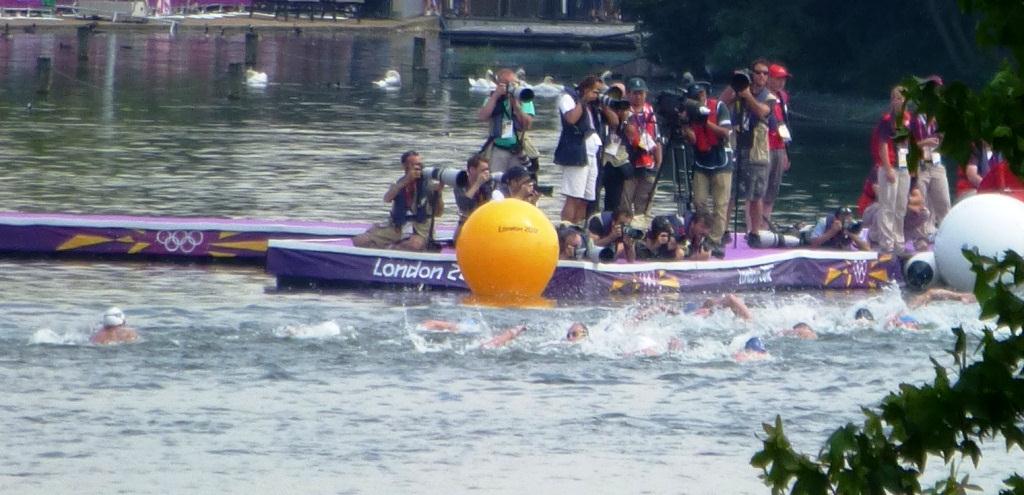The last few postings on this blog have been about the fast-fading memories of the 2012 Olympics and it might be asked what relevance  photos and discussions about the Olympics have for blog about writing a novel. Fair question — but I’d reply ‘everything’.
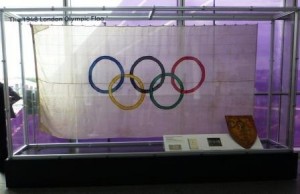
One of the novel’s themes is identity — one of the two protagonists is non-British but sees herself as a Londoner. One source of conflict is how she deals with the difference between London and the rest of Britain — the cosmopolitan international city contrasted with the timeless English landscapes only forty miles away (and less than an hour and a half’s travelling time as I demonstrated with a nifty one train, two tube and car journey away from Blackfriars after coming into London on a Sunday for the women’s marathon).
It’s also been fascinating, from a writer’s perspective, to observe how the city has been
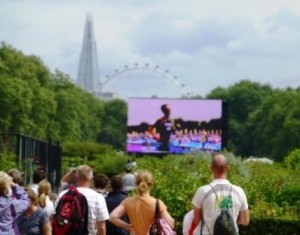
transformed from the territory of sharp-elbowed suits into a uniquely welcoming environment. The streets and tubes have been full of people obviously enjoying themselves so much — not just international tourists but plenty of British visitors who’ve come to enjoy London. It’s wonderful to see the pleasure people take in being photographed next to Big Ben, Buckingham Palace or, bizarrely, some of the Wenlock and Mandeville figures that have been dotted around London on the Mayor of London’s strolls.
Perhaps my favourite aspect of the Olympic and Paralympic period has been the almost ubiquitous ‘games makers’. I’ve travelled to plenty of tourist cities (I used to work for British Airways) but I’ve never seen anything remotely like this small army of volunteers in stations, tourist sights and near Olympic venues whose sole objective is to welcome and help people to the city.
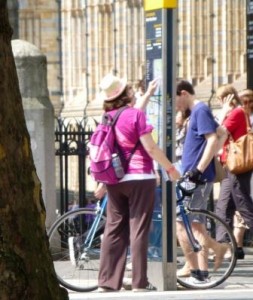
And they’re still doing it. I was given a free copy of this week’s Time Out by a games maker in Covent Garden this week and the ‘Boris’ maps they’re handing out are brilliant.
Whenever I’ve seen the volunteers I’ve feel completely humbled — and grateful that they’re giving such a good impression of the country to visitors that are here. This parallels the incredibly positive image of London that’s been projected via the Olympic media coverage to people around the world.
I wondered how long the interest in London would last after the Olympics but they appear to have been so successful that London will retain its interest as a city for a very long time for people all over the world.
One of the most intriguing aspects of the Olympics is how much London 2012 would
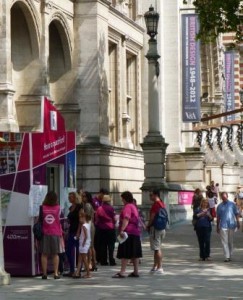
represent the rest of the country – London being seen by the rest of the country already as something apart and privileged (albeit that the Olympic Park is situated in some of the poorest boroughs of the country on any measure). This could have been a valid criticism until the medals started coming in and that the importance of achievement on home soil was — and our first wasYorkshire’s Lizzie Armitstead’s silver on Sunday in the women’s cycle road race (of which I saw the start and almost finish – see photos on my Olympic photo page).
The athletes who ‘medalled’ (to use that jarring verb-noun mutation) have come from all parts of the country — from Jessica Ennis’s Sheffield to Andy Murray’s Dunblane to Ben Ainslie’s Cornwall to Greg Rutherford’s prosaic Milton Keynes.
It was weird for me to discover that Mo Farah comes from Feltham (where I worked for four years and used to drive past Farah’s school almost every night) and that he trained at St. Mary’s College in Strawberry Hill, Twickenham for ten years, while I was living just up the road. My personal connections are tenuous at best but I guess millions of people are doing the same up and down the country — which hopefully proves a point about a sense of ownership.
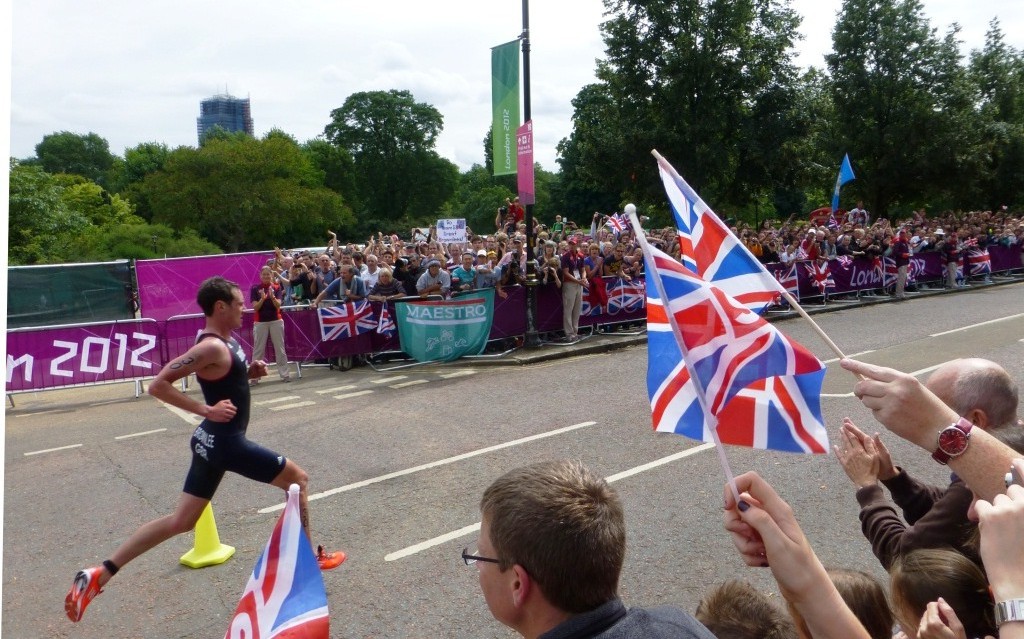
The theme of identity — the question of ‘who are “we”‘ — might perhaps be the most lasting legacy of these Olympic games (and ‘we’ as the British appear to be extraordinarily unified, at least from the media coverage) — and that’s a big issue in my novel.
Setting is also important in the novel. I’m not sure why but I was on the Jubilee Line heading for Westminster to find a place to watch the women’s marathon and I decided to switch at Bond Street to the Central Line and head to St. Paul’s instead. Co-incidentally, I’ve been revising a part of the novel where my characters walk around St. Paul’s, which was a good move in terms of getting good places to watch the runners come past. The marathon route followed closely, if not identically, the route that my characters take around the Blackfriars/St. Paul’s area.
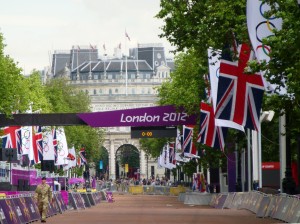
Sport is also drama in a very pure sense — with commentators and competitors using the same lexicon as writers do about constructing narrative — with expectations, twists and tuns, surprises, sub-plots, etc,.
The BBC are very good at creating montages of these sporting moments but, for me, there was one that transcended them all. It was when Gemma Gibbons, the Judo player from Charlton, exceeded her expectations by winning her semi-final bout with a single move. She started crying and looked upwards, mouthing ‘I love you, mum’. Her mother died of leukaemia eight years before, having pushed her daughter into starting her judo career. It was a candid moment that must have made anyone who’s ever lost a parent break sown in a similar way.
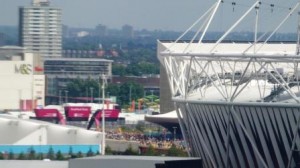
Then there’s the parallel of novel writing with sporting achievement. I was reading a conversation on Twitter today between some literary agents who were making the point to writers that novel writing is more like a marathon than any other event, which certainly seems true in my case.
There are plenty of parallels between these athletes training away in anti-social hours for four years and undiscovered writers who similarly toil with no guarantee of reward for their efforts — and also of the odds against achieving success. I’m not sure they stand up in detail but there are certainly morals of perseverance, determination and self-belief that can apply to writers as much as athletes.
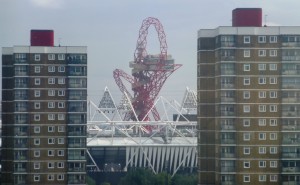
But one thing Olympic athletes have that writers don’t is an organisation like Sport England — whose various programmes in identifying talent have given financial and coaching support to those they’ve identified as having promise. That’s the opposite of the literary world where writers invest in their own training and there’s comparatively tiny government funding to help nurture new talent.
Coming third in the medal table, perhaps the sporting approach works?
